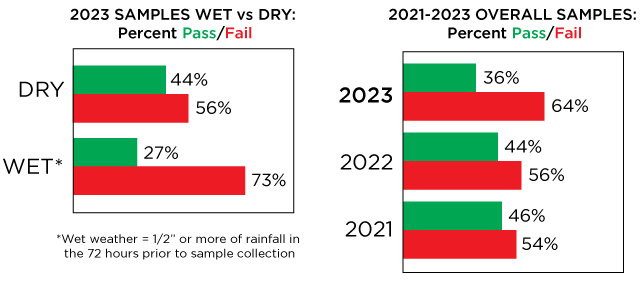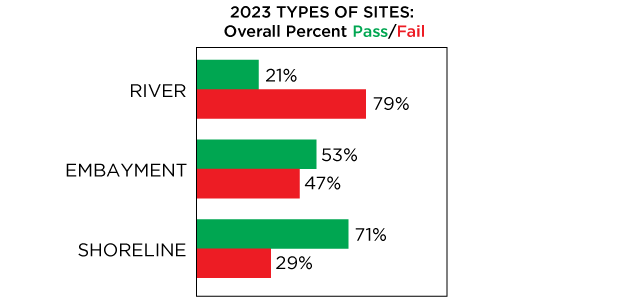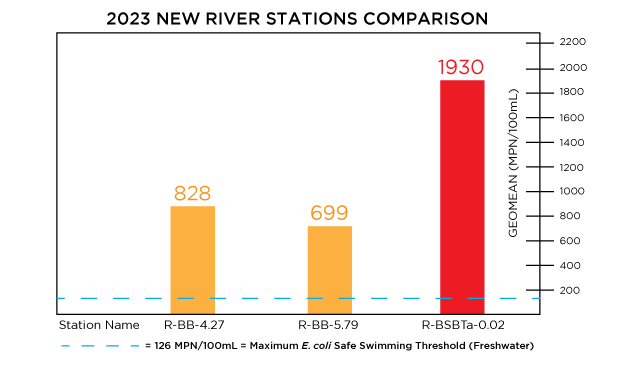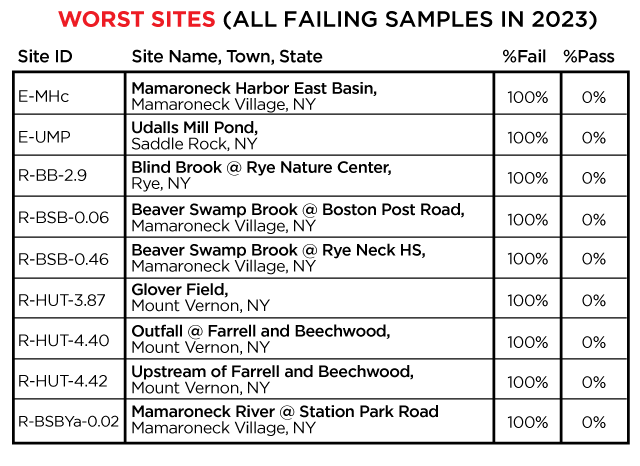2023 Bacteria Monitoring Stats
65 sites, 777 water samples,
28 trained volunteers
2023 Bacteria Sampling Data
Weekly Monitoring Data Maps
Westchester, NY & Greenwich, CT pdf xls
Queens & Nassau Counties pdf xls
Summary by Site pdf xls
Quality Assurance Project Plan pdf
Map Legend
Quick Links
Select Year: 2024 • 2023 • 2022 • 2021 • 2020 • 2019 • 2018 • 2017 • 2016 • 2015 • 2014
Fecal Bacteria Monitoring
In 2023, Save the Sound collected and tested water quality from Greenwich, CT, through Westchester County, to Queens, and into Nassau County. Samples were analyzed for fecal indicator bacteria, Enterococcus in marine water and E. coli in freshwater, which are used to determine if waters are safe for swimming. Click on each site on the map above to see what we found. The colors reflect average bacteria levels at each site. The “% Pass” and “% Fail” show how many samples passed or failed the single sample criteria for safe swimming in New York and Connecticut.
State Criteria for Safe Swimming
Samples greater than 104 CFU/100 mL Enterococcus are considered unsafe for swimming in marine water. Samples greater than 235 CFU/100 mL E. coli are considered unsafe for swimming in fresh water.
A weighted average (geometric mean) greater than 35 CFU/100 mL Enterococcus is considered unsafe for swimming in marine water and greater than 126 CFU/100 mL E. coli is considered unsafe for swimming in fresh water.
Summary of Findings
Overall Failure Rates Increase
Overall fecal contamination rates increased from 2022 to 2023 from 56% to 64%.Three additional river stations added in 2023 all had high failure rates, which contributes to the higher overall failure rate this season. An increase of 3% in dry weather failures occurred this year. The wet weather failure rate decreased by 1%.
 Failure is based on safe swimming criteria used in Connecticut and New York to monitor and manage beaches. Because wet weather causes pollution to flush off the landscape and into the waterways, and can trigger overflows of untreated sewage, Save the Sound reports on wet weather samples separately. This year, as in all past years, fecal contamination was higher after rainfall at most locations.
Failure is based on safe swimming criteria used in Connecticut and New York to monitor and manage beaches. Because wet weather causes pollution to flush off the landscape and into the waterways, and can trigger overflows of untreated sewage, Save the Sound reports on wet weather samples separately. This year, as in all past years, fecal contamination was higher after rainfall at most locations.
River Sites Show Decline
Rivers remain the most polluted sites in 2023. There was a collective increase of 4% in failure rate in rivers compared to 2022. Many of these rivers running through our communities are carrying an unacceptable level of fecal contamination which poses a risk to human health.

New Additions Show Elevated Levels
Three new stations were added near locations we monitor that have shown consistently elevated levels of bacteria over the years. Two of these stations (R-BB-4.27 & R-BB-5.79) are on Blind Brook and one is a tributary to Beaver Swamp Brook (R-BSBTa-0.02), all in Westchester County. All three of these stations have elevated levels of fecal indicator bacteria. Save the Sound staff will be conducting field investigations around these stations with a focus of identifying and correcting any sources of pollution.

Best and Worst of 2023
One location this year did not have a failing sample. There were 9 locations that failed every time they were sampled.


Be a Part of the Solution
As long as rivers, streams, and our coastline are still polluted, Save the Sound remains committed to restoring water quality where people swim, fish, and paddle. Save the Sound encourages all members of the public to be on the lookout for water pollution and report anything they see to their local health authorities and to Save the Sound at pollution@savethesound.org.
- Everyone can help reduce sewage pollution sources simply by conserving water, which will lessen the wear-and-tear on our water infrastructure and reduce sewage overflows by lowering the volume of water in the system.
- Homeowners need to repair the sewer lines that connect homes and businesses to municipal sewers, or maintain their septic systems.
- Dog owners should put pet waste in the trash, never in a catch basin or on the street.
- Every community and homeowner should work on strategies like creating rain gardens to help reduce runoff.
- If you see sewage overflowing in your community, please let us know by sending a photograph or video plus the time and location of the overflow to pollution@savethesound.org.
